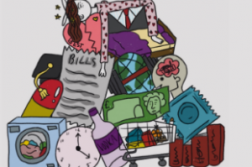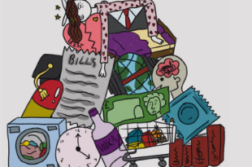Sustainability. Ethical. Vegan. Slow fashion. Organic. Today’s buzzwords get slapped on our clothes labels by brands trying to capitalise on our modern sensibilities, we want to save the world, and we’ve been told that we can do that by changing our shopping habits: buy less, buy better.
In reaction, several high street brands have created ‘ethical’ lines, think PrimarkCares; Asos: Responsible Edit; Boohoo: For the Future; H&M: conscious collection; Mango: Committed; Zara: Join Life. These lines seem positive on the surface, but in reality, are just as damaging as their regular lines (none have more than 3/5 on GoodonYou in any of their 3 categories). You might be thinking then, perhaps you should use a sustainable brand to fill out your summer holiday shopping wants? Good examples might be TRAID, iSecondthat, Gather&see, we are Tala, Lucy and Yak.
Unfortunately, these brands are often more expensive and too small to be successful alternatives to their fast fashion counterparts, so really, what can we do to make our wardrobes ethical without bankrupting ourselves and staying somewhat on-trend?
Making your wardrobe last:
Investing in good quality basics (think French capsule wardrobe) should be your first port of call. Black, white and grey tees, blue jeans and black trousers are timeless pieces that you’ll be able to use for years, look for flattering cuts for your body type and think about spending a little bit more than you usually would on these sorts of clothes, it will really elevate your outfits.
Learn how to take care of your clothes before you cut out that pesky label. Making sure that you know what temperature and how best to dry your clothes will make them last longer, which is not only going to help the environment but also save you some money too. (pro-tip: invest in a delicate bag for your underwear and wash at 30 degrees C max).
Avoid fad trends. In an age of social media, fast-moving trends are inevitable, but that doesn’t mean you have to buy into every single one. Try to avoid impulse buying; sleep on it before you spend and you’ll also save yourself some money too.
Know your measurements and find a tailor. Seriously, knowing your exact sizes will help you when you’re shopping to find clothes that actually fit you, and having a tailor/seamstress that you trust will give you an option to make that pair of trousers you really like a part of your wardrobe.
Don’t binge shop. A Shein or Asos haul might be fun but did you know that the majority of clothes sent back to online stores get sent straight to landfills? Buy what you think you’re going to keep: know your size, your body type and what colours suit you best.
Invest in a needle and thread. Try not to picture your nan’s biscuit tin that isn’t a biscuit tin and think instead about that little bag of spare buttons that comes with your clothes. Ever sewn one on yourself? Learn how to, it’ll save you begging your nan to fix that shirt for you before your grad job interview.
Sustainable fashion doesn’t just have to be a brand you can’t afford, in reality, it’s simple: make the clothes you own last and, when in doubt, donate don’t bin.
Websites to look at:
Good on You (rating brands on their ethics and sustainability) – https://goodonyou.eco/
‘Where to buy ethical fashion on the high street?’ – https://www.curiouslyconscious.com/2019/07/where-to-buy-ethical-fashion-uk-high-street.html/
17 Eco-Friendly and Sustainable Brands – https://blancliving.co/blogs/news/the-eco-friendly-and-sustainable-brands-we-love
Making your clothes last forever – https://www.theguardian.com/fashion/2019/aug/01/slow-fashion-how-to-keep-your-favourite-clothes-for-ever-from-laundering-to-moth-proofing



